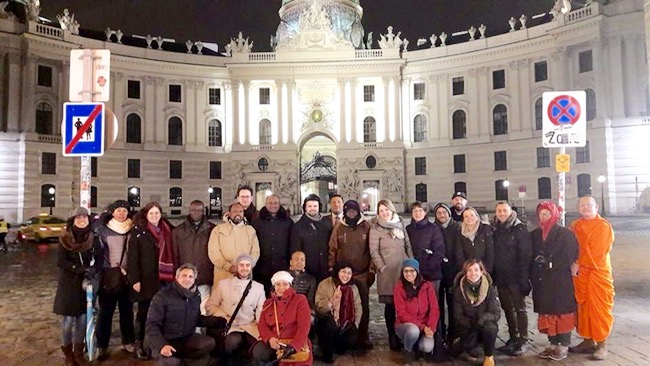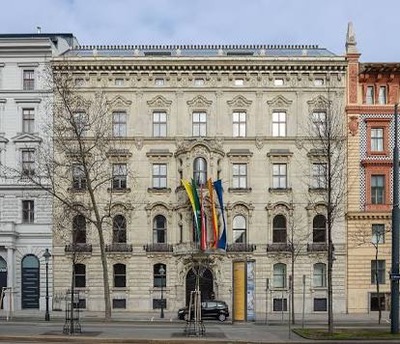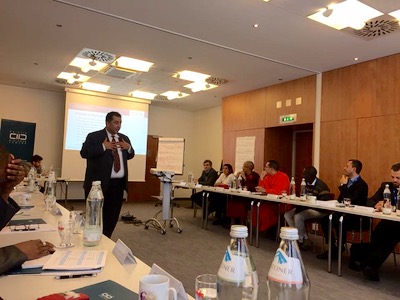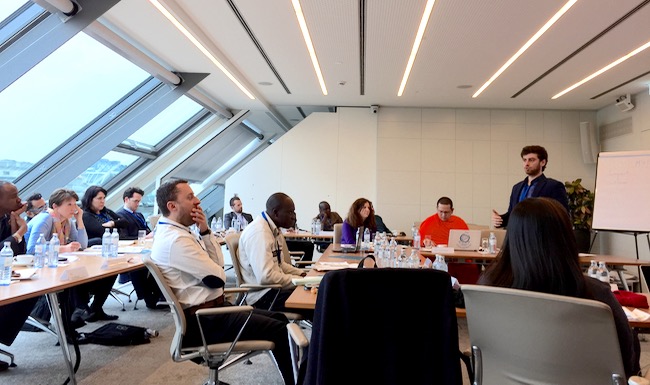IARJ@Work: 2018 Fellows Describe Hopes for Interreligious Dialogue

EDITOR’S NOTE—The KAICIID Center opened in Vienna in 2012 with high hopes from many religious leaders and scholars—as well as public protests in Austria against Saudi Arabia’s record on human rights. The full name of the center is the King Abdullah bin Abdulaziz International Centre for Interreligious and Intercultural Dialogue, named for the ruler of the kingdom from 2005 until his death in 2015. In addition to Saudi Arabia, the Center’s original co-sponsors were Austria and Spain; the Vatican later became a sponsor.
The center has broadened its global network of active participants, fostering an ever-growing number of programs in inter-religious dialogue and research. One of those initiatives is the International Fellows Programme,
now in its fourth year.
One of our active IARJ members, Bhavya Srivastava of India, is part of this year’s group of Fellows. We asked Bhavya to report on how his colleagues expect their work will impact the world.

Is there a solution to the Israeli and Palestinian conflict? Could Myanmar end persecution of minorities and embrace its diverse population? Can Nigerian relations between Christians and Muslims become more peaceful and constructive? Will patriarchal cultures around the world allow gender equality? On balance, is religion becoming a more tolerant, or intolerant, force in the world? Are there religious movements we should highlight that are welcoming diversity?
These questions, torn from headlines around the world, have become the realm of the International Fellows Programme, which enrolled its inaugural group in 2015 and now has an active 112-member alumni network. As the KAICIID center describes the group’s mission: The Fellows aim to build peace and social cohesion in their communities, where too often intercommunal tension is rising or conflict has occurred caused by deteriorating social cohesion. Dialogue, both inter- and intra-religious, helps bridge the growing divisions between communities and individuals and transforms prejudices and misconceptions into mutual appreciation and acceptance.
Counting alumni and the new 2018 fellows, there are now 142 of us from diverse backgrounds. We have an average age of 40 years. We are 40% female and 60% male. More than 75% of the fellows are affiliated with academic and research institutions. Fellows come from eight religious affiliations, 38 countries and 5 continents.

As I started my work with the fellows recently, I took time to talk with my colleagues about their hopes for our collective work.
In our training program, Mohammad Abu-Nimr told us that this program should equip us to become more effective peace-builders when we return to our own regions of the world. He compared the process in the center’s training sessions to preparing chefs in a culinary school. We are telling you the ingredients, and showing you techniques for cooking,
he said, and ultimately the real thing happens in your kitchen!
This is what motivates us within the 2018 class.
Fellow Aleksandra Duric from Serbia said, I want to learn more about inter-religious dialogue, be able to teach people more about it and to include various youth groups. I want to apply this knowledge specifically within youth groups in the Orthodox Catholic and Evangelical Protestant communities in Serbia. I want to spread this knowledge in educational programs, especially in more informal ways with young people.
Fellow Lisa Garvin, from the U.S., hopes that she will be able to implement these strategies with undergraduate university students.
Archimandrite Maximise Thomas, who is secretary to external affairs for his church, hopes that he can make more friends around the world from other religious traditions. In turn, these new friendships can help him broaden his professional work.
Fellow Sara from Spain works with educational groups and said, I would like to start a project in Mexico in the frontier between the United States and Mexico in schools there—to show them that beyond Christianity there are other cultures, other religions and other ways to live.
Fellow Daras Dzyubansky from Ukraine says he will use his new knowledge in his interfaith work in his homeland and his teaching in seminary. I will use this experience to preach to future seminarians, our future leaders, to train them in conflict resolution and peace building and interfaith dialogue.
Pierre Ahmad Gustavo from France is particularly interested in the theoretical aspects of inter-religious dialogue and says he hopes to use this new knowledge to develop educational projects for a diverse audience.
Fellow Amanpreet Dogra already is a facilitator in peace and conflict-transformation programs, and says, This training will enhance my skills as a facilitator and is giving me a different perspective about religion. I will definitely include what I am learning in my upcoming workshops.
Fellow Mugu Zakka Bako is a peace builder and trauma healer in Nigeria, and says, New knowledge and new skills can help me deal with violent communities, especially people who manipulate religion to cause conflict.
Claudia Giampietro is a communications consultant working with a group that tries to empower Catholic women. Before arriving at the KAICIID center, she says, I was thinking this might be like other conferences where we would sit and listen and not have much personal involvement. But, I am very happy because I found there is a lot of personal involvement in the fellowship.
Buddhist monk Vicittasara from Myanmar says, I am planning to build up my own college in Yangon and this will help me introduce a dialogue between religions, cultures and nationalities.
Fellow Dr. Simran Jeet Singh has long been engaged with justice work and building bridges across various communities, and he is particularly passionate about addressing discrimination and xenophobia.
Director General of KAICIID, Fahad Abualnasr described the vision behind the Fellows programme:
Our aim when we started the Fellows program was to connect religious educators with each other, and to empower them to build bridges of dialogue, first within their own communities, but also with other communities. There were very few opportunities for religious educators to meet and learn from their peers from other religions or other countries. This was the gap we were hoping to fill.
Care to read more?
GET INVOLVED WITH IARJ—We invite anyone interested in the International Association of Religion Journalists to continue watching our website and our Twitter feed for more reflections on this global conference over the next few weeks. If you are a journalist with a focus on covering religious and cultural diversity, then please consider joining our organization.
Bhavya Srivastava is a journalist from India, a member of the IARJ and a 2018 KAICIID Fellow. You can follow Bhavya on Twitter @mebhavya

